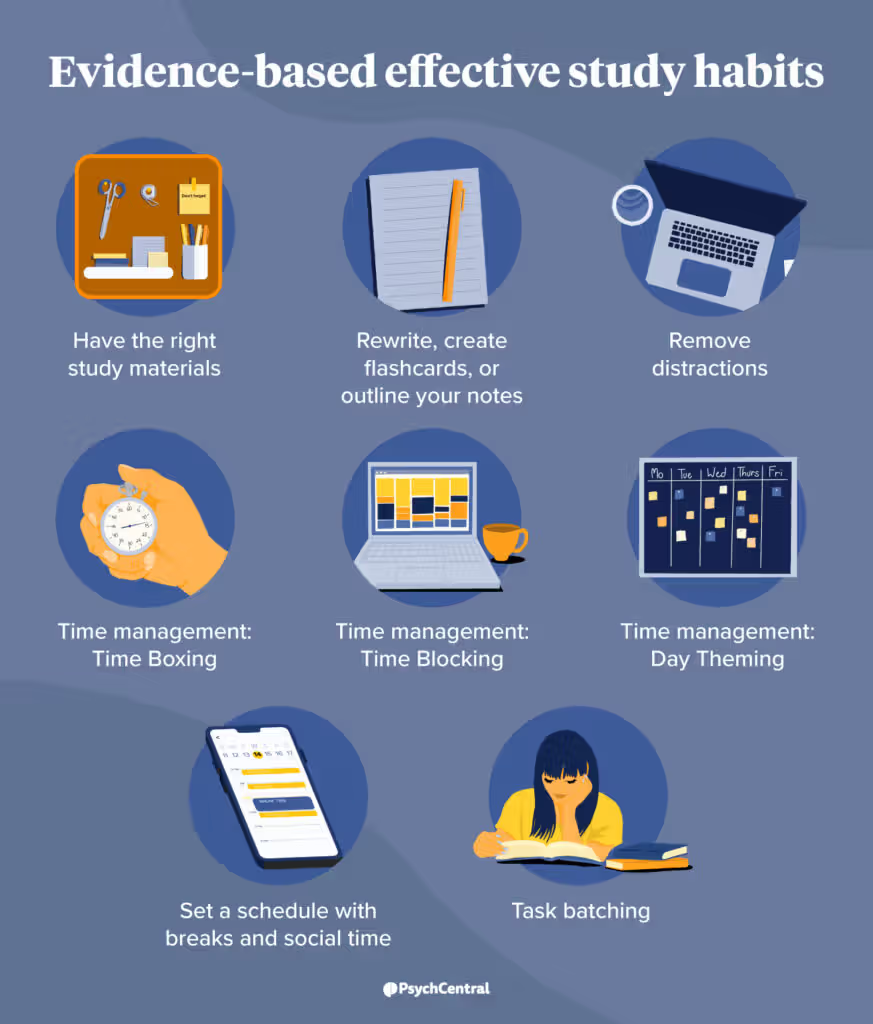Studying effectively is one of the most crucial skills for success in graduate school, especially in demanding fields like health sciences. Many students spend hours reading and re-reading textbooks, only to find that the information slips away before the next exam. The truth is, effective studying isn’t about how long you study—it’s about how smart you study.
If you’re a graduate student looking to improve your grades and reduce stress, it’s time to upgrade your study strategies. In this article, we’ll explore 10 research-backed techniques that will help you retain information better, understand complex material, and manage your study time more efficiently.
Set the Stage: Build a Productive Study Environment
Before diving into study techniques, it’s essential to prepare your body and mind for learning. Your study environment can significantly influence your concentration and retention.
1. Get Consistent, Quality Sleep
Sleep plays a vital role in memory consolidation. According to a 2019 study, students who maintained healthy sleep schedules performed better academically. Don’t wait until the night before your exam to rest—prioritize sleep throughout your study period.
2. Switch Up Your Environment
Changing your study location can improve memory recall. Consider studying in a library, coffee shop, or a quiet outdoor space. A change in scenery can refresh your focus and make studying more engaging.
3. Eliminate Distractions
Turn off notifications, close irrelevant tabs on your computer, and keep your phone away. Use tools like “Focus Mode” or apps like Forest to stay distraction-free during study sessions.
4. Listen to Instrumental Music
Classical or lo-fi beats can enhance concentration. Avoid music with lyrics, which can interfere with verbal processing and focus.
5. Eat Brain-Boosting Snacks
Avoid sugary snacks or caffeine overload. Choose nuts, berries, apples, or whole grains for steady energy and improved brain function.

10 Best Study Techniques That Actually Work
1. SQ3R Method
The SQ3R method—Survey, Question, Read, Recite, Review—is a classic strategy for textbook reading comprehension.
- Survey: Skim through headings, charts, and summaries before reading.
- Question: Ask questions like “What is this chapter about?” or “What do I already know?”
- Read: Read actively, looking for answers to your questions.
- Recite: After reading, explain what you learned in your own words.
- Review: Summarize key points and test yourself to reinforce memory.
This method encourages active engagement and helps retain information more effectively.
2. Retrieval Practice
Instead of reviewing material repeatedly, test yourself. Retrieval practice involves recalling facts and concepts from memory, which strengthens neural connections.
- Use flashcards and quiz apps.
- Answer questions without looking at your notes.
- Try “brain dumps” by writing everything you know on a topic.
This is one of the most effective ways to reinforce learning and prepare for exams.
3. Spaced Practice (Distributed Learning)
Cramming may work short-term, but it doesn’t lead to lasting knowledge. Spaced practice involves reviewing material over increasing intervals of time.
Try this schedule:
- Day 1: Learn the material.
- Day 2–3: Review.
- Day 7: Review again.
- Day 14+: Final review before exams.
This technique improves long-term retention and helps with concept integration.
4. PQ4R Method
This method is ideal for reading comprehension and mirrors the SQ3R strategy but adds reflection for deeper learning.
- Preview: Skim the chapter.
- Question: Ask what you hope to learn.
- Read: Read carefully, seeking answers.
- Reflect: Think critically about the content.
- Recite: Summarize in your own words.
- Review: Go back and answer your questions.
5. Feynman Techniqu
This method helps you simplify and master complex topics by teaching them as if to a child.
- Write down the topic at the top of a page.
- Explain the concept in simple terms.
- Identify gaps in your understanding.
- Review and simplify further.
This technique forces you to actively engage and break down ideas for deeper comprehension.
6. Leitner System
The Leitner System is a flashcard technique that uses spaced repetition to reinforce weak areas.
- Organize cards into boxes.
- If you get a card correct, move it to the next box.
- If wrong, move it back to the first box.
- Study Box 1 daily, Box 2 every other day, and so on.
This helps you focus on concepts you struggle with while reducing time spent on material you already know.
7. Color-Coded Notes
Color enhances memory. According to research, warm colors like red and yellow improve attention and recall.
Tips:
- Use red for core concepts.
- Yellow for definitions.
- Blue/green for supporting points.
- Avoid over-coloring—highlight only key points.
This strategy improves organization and helps you visually prioritize information.
8. Mind Mapping
Mind maps visually organize concepts, making them easier to understand and remember.
Steps:
- Write your topic in the center.
- Add main branches for each sub-topic.
- Add smaller branches for supporting details.
- Use colors and icons to distinguish ideas.
This is ideal for complex subjects like physiology or case-based learning in health sciences.
9. Exercise Before Studying
A short workout or brisk walk increases blood flow to the brain, boosts mood, and enhances focus.
Benefits:
- Improves cognitive performance.
- Reduces mental fatigue.
- Increases energy and motivation.
Try 20 minutes of cardio or stretching before you hit the books.
10. Study Before Sleep
Your brain organizes and strengthens memories while you sleep. Studying before bedtime can help improve recall the next day.
Tips:
- Avoid all-nighters.
- Study a few hours before bed, then get quality sleep.
- Review in the morning for reinforcement.
Research shows that sleep acts as a memory enhancer—what you review before bed gets reinforced during rest.
Graduate school is intense, but it doesn’t have to be overwhelming. Whether you’re studying for board exams, clinical evaluations, or final projects, using the right study techniques can make all the difference. With a combination of retrieval practice, spaced repetition, Feynman explanations, and a focused environment, you can study smarter—not harder.
Start small by trying one or two methods, then build a routine that works for your schedule and learning style. Remember, effective studying is a skill, and like any skill, it can be mastered with the right tools and habits.







